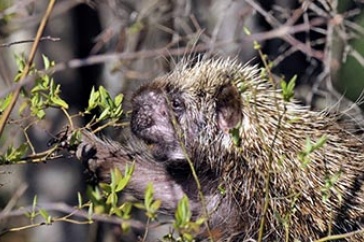UNH Lab Finds Often Fatal Fungal Disease in New England’s Wild Porcupines

A debilitating, often fatal, fungal disease has been discovered in wild North American porcupines in Maine, Massachusetts, and New Hampshire similar to this one photographed at the Quabbin Reservoir near Athol, Mass. Credit: Bill Thompson/USFWS
EDITORS: David Needle is available to speak to reporters at david.needle@unh.edu.
DURHAM, N.H.—A debilitating, often fatal, fungal disease has been discovered in wild North American porcupines in Maine, Massachusetts and New Hampshire, according to the New Hampshire Veterinary Diagnostic Laboratory at the University of New Hampshire.
UNH pathologists found that 12 wild porcupines taken to wildlife rehabilitators in Maine and Massachusetts with what appeared to be mange were actually infected with a disease caused by a common fungal organism found in domesticated cats and dogs, mice and livestock, and sometimes humans. The porcupines were among 44 submitted to the lab during a seven-year study period.
“The fungus usually causes localized, often minor skin infections in animals and people. In porcupines, however, the skin lesion becomes severe and spreads to the whole body, resulting in debilitation and death if not treated. The disease caused by this fungus has never been reported in porcupines,” said David Needle, senior veterinary pathologist and assistant clinical professor with the lab.
“The rarity and severity of this skin lesion occurring in likely unrelated wild porcupines from three states is noteworthy and suggests there may be a subpopulation of the species with susceptibility for this particular pathogen, as has been seen with scabies,” Needle said.
The newly discovered fungal disease in porcupines is zoonotic, which means it can be passed on to humans, although there are no documented cases of it being caused by contact with porcupines. It also comes at a time when there has been an emergence of fungal diseases that have resulted in significant population declines of bats, amphibians, and snakes on multiple continents.
“While not as severe across the population of porcupines as other recently described fungal diseases have been in their host species, it is still worth noting that this is another fungal disease that is emerging in wild animals,” Needle said. “North American porcupines are an important and widespread member of the wild lands of New Hampshire and New England, with impacts on various tree species throughout the state. The porcupine serves as a primary food source for the fisher, which is itself an iconic animal of New Hampshire on the decline. This study is therefore important from the standpoint of the species affected, but also what effect a decrease in this species population or activities could have on the wild landscape and the natural food web,” Needle said.
This research is supported by the New Hampshire Agricultural Experiment Station and the State of New Hampshire. It is part of the New Hampshire Veterinary Diagnostic Laboratory’s One Health effort, a collaborative, global movement that unites physicians, veterinarians, ecologists, and many other life science professionals in addressing and preventing health threats in people, animals, and the environment.
As part of the NH Agricultural Experiment Station at UNH, the New Hampshire Veterinary Diagnostic Laboratory serves the state of New Hampshire as a key partner with the New Hampshire commissioner of agriculture and state veterinarian in their efforts to monitor and control important animal diseases. The lab also provides diagnostic services to hundreds of veterinarians from New Hampshire and New England who use the lab’s histopathology, microbiology, serology, and necropsy services for the diagnosis of animal diseases in pets, farm animals, wildlife, zoo and marine animals.
The University of New Hampshire inspires innovation and transforms lives in our state, nation and world. More than 16,000 students from all 50 states and 71 countries engage with an award-winning faculty in top-ranked programs in business, engineering, law, health and human services, liberal arts and the sciences across more than 200 programs of study. As one of the nation’s highest-performing research universities, UNH partners with NASA, NOAA, NSF and NIH, and receives more than $110 million in competitive external funding every year to further explore and define the frontiers of land, sea and space.
PHOTO AVAILABLE FOR DOWNLOAD
https://colsa.unh.edu/nhaes/sites/default/files/media/images/naporcupine.jpg
A debilitating, often fatal, fungal disease has been discovered in wild North American porcupines in Maine, Massachusetts, and New Hampshire similar to this one photographed at the Quabbin Reservoir near Athol, Mass. Credit: Bill Thompson/USFWS
-
Media Contact
Lori Tyler Gula, PhD | NH Agricultural Experiment Station | lori.gula@unh.edu | 603-862-1452
Latest News
-
April 15, 2025
-
Research Finds Rural Americans Carry Heavy Burden Accessing Social Security Benefits and InformationMarch 27, 2025
-
March 25, 2025
-
March 17, 2025
-
March 12, 2025













































